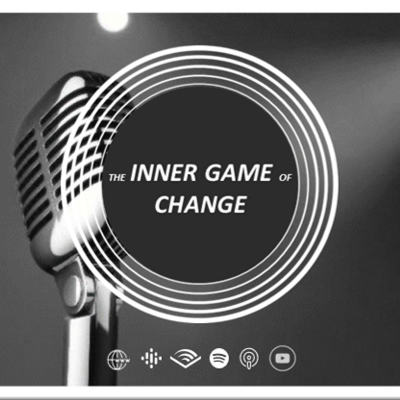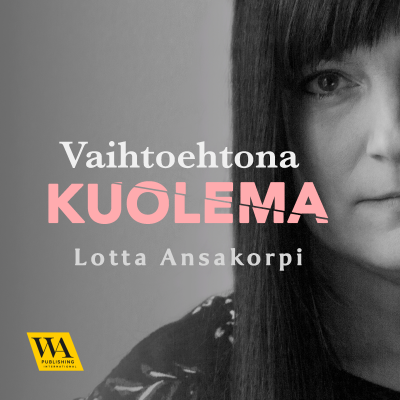
The Inner Game of Change
englanti
Talous & ura
Rajoitettu tarjous
1 kuukausi hintaan 1 €
Sitten 7,99 € / kuukausiPeru milloin tahansa.
- Podimon podcastit
- Lataa offline-käyttöön
Lisää The Inner Game of Change
Welcome to The Inner Game of Change podcast, where we dive deep into the complexities of managing organisational change. Tailored for leaders, change practitioners, and anyone driving transformation, our episodes explore key topics like leadership, communication, change capability, and process design. Expert guests share practical strategies and insights to help you navigate and lead successful change initiatives. Listen in to learn fresh ideas and perspectives from a variety of industries, and gain the tools and knowledge you need to lead transformation with confidence. Explore our episodes at www.theinnergameofchange.com.au, Spotify, Apple Podcasts, Youtube or anywhere you listen to your podcasts.
Kaikki jaksot
123 jaksotA Change Question - What Deserves Attention At This Stage of the Change?
Welcome to A Change Question — a special mini-series from The Inner Game of Change. [https://www.theinnergameofchange.com.au/podcast] In each short, solo episode, I bring you one question worth sitting with — the kind that can gently shape how we think, work, and move through our lives. As change unfolds, our attention often becomes scattered. We try to notice everything. The risks. The effort. The expectations. But each stage of a change has its own centre of gravity. Something new begins to rise. Something quieter, but more essential, asks for our attention. In this short, reflective episode, Ali explores the question: What deserves attention at this stage of the change? Drawing on The Little Prince, Ernest Hemingway’s The Old Man and the Sea, the writings of Marcus Aurelius and Simone Weil, and examples from Jane Eyre and The Lord of the Rings, this episode looks at how attention shifts as we move through different stages of a change. This is not advice. It is a gentle pause. A moment to consider what truly matters now, what no longer needs to be held so tightly, and what might open if we offered our attention with more intention. A short episode for anyone sensing that the next stage of their change might require a different kind of focus. Send us a text [https://www.buzzsprout.com/twilio/text_messages/1751572/open_sms] Ali Juma @The Inner Game of Change podcast Follow me on LinkedIn
E99 - A Return to Purpose Through Change - Podcast With Meg Smith
Welcome to The Inner Game of Change. [https://www.theinnergameofchange.com.au/podcast] where we explore the thinking behind the doing of change. Today I sit down with the thoughtful and very grounded Meg Smith [https://www.linkedin.com/in/megsmithnz/], co author of the practical and timely book Microsoft 365 Copilot Adoption [https://www.amazon.com.au/Microsoft-365-Copilot-Adoption-Consultants/dp/0135468043]. It is a clear and generous guide for leaders and consultants who want to understand what real adoption looks like inside organisations. Meg brings that same clarity into our conversation. We speak about courage, curiosity, learning, and the real experience people are having as artificial intelligence moves into their daily work. One idea she raises that really stayed with me is this invitation to return to the purpose of our work. Instead of asking how to control or block new tools, ask whether we are still fulfilling the reason we show up to serve others. It is a powerful shift and it opens the door to much better conversations about change. This is a warm and very human exchange about change, self agency, leadership, and the future we are shaping together. I am grateful to have Meg chatting with me today. Oh.. And stay with us after the conversation for a short ChatGPT reflection. About Meg I've been fortunate to have an interesting and rewarding career in tech, and I believe the benefits of technology should be available for everyone. I develop programmes and content to teach AI adoption and skills so that people can use it to advance their careers, organisations and communities. I have learned that being humble enough to ask questions will get you further than thinking you have all the answers. I have seen countless examples of how technology can be used to save time, make money, and create memorable experiences. I have also seen how easy it is to miss out on those benefits when there is a disconnect - be that between the people buying the tech and those who are meant to be using it, confusing tools and processes, and inequitable access. My mahi (work) with Cloverbase is focused on creating AIenablement programs. Projects include: -Bespoke training for Microsoft's global teams in Design Thinking & AI sales patterns -90 Day Mentoring Challenge career acceleration program -AI Fundamentals for business leaders and professionals -AI Governance and Strategy I'm available to speak at events, run workshops, or design bespoke AI enablement programs. Send me a message to set up a time to chat. Contact Meg’s Profile linkedin.com/in/megsmithnz [https://www.linkedin.com/in/megsmithnz] Send us a text [https://www.buzzsprout.com/twilio/text_messages/1751572/open_sms] Ali Juma @The Inner Game of Change podcast Follow me on LinkedIn
A Change Question - How Do I Know When I Have Outgrown This Change?
Welcome to A Change Question — a special mini-series from The Inner Game of Change. [https://www.theinnergameofchange.com.au/podcast] In each short, solo episode, I bring you one question worth sitting with — the kind that can spark both personal and professional shifts. There are moments in life when a change that once felt right begins to feel small. It has shaped us, stretched us, and carried us for a while. Then, almost quietly, we realise we have moved beyond it. In this short, reflective episode, Ali explores the question: How do I know when I have outgrown this change? Drawing on Paulo Coelho’s The Alchemist, the words of Leonard Cohen, the insight of Toni Morrison, and examples from The Lord of the Rings and Little Women, this episode looks at the deeper layers of growth and the quiet signals that tell us we are ready for something different. This is not advice. It is a gentle pause. A moment to think about the changes that have served us, the ones we may be carrying out of habit, and the possibilities that open when we release what no longer fits. A short episode for anyone sensing that they have outgrown a chapter of their life, their work, or their identity. Send us a text [https://www.buzzsprout.com/twilio/text_messages/1751572/open_sms] Ali Juma @The Inner Game of Change podcast Follow me on LinkedIn
E98 - Thriving In The Human+AI Change - Podcast With Ross Dawson
Welcome to The Inner Game of Change. [https://www.theinnergameofchange.com.au/podcast] where we explore the thinking behind the doing of change. In this episode, I am joined by Ross Dawson [https://www.linkedin.com/in/futuristkeynotespeaker/]—futurist, keynote speaker, and author of five influential books, including Thriving on Overload and Developing Knowledge-Based Client Relationships. [https://rossdawson.com/books/] Ross is known globally for his work at the intersection of foresight, networked systems, and human–AI collaboration. We unpack what it really means to lead in a world where AI is no longer just a tool, but a thinking partner. Ross shares his five-part framework—purpose, framing, filtering, attention, synthesis—for building clarity in the face of information overload. Together, we explore what trust looks like in human–AI teams, how to reimagine organisational design, and why every leader today needs to become their own futurist. If you are navigating change, designing future-fit teams, or rethinking how humans and machines work together—this episode offers both depth and direction. I am grateful to have Ross chatting with me today. Ross Dawson In demand worldwide as a futurist, keynote speaker and board advisor: - Has delivered keynotes and strategy sessions in over 30 countries across 6 continents - Works with boards and leadership teams of major organizations globally - Has run executive education programs and lectured at top academic institutions around the world - Frequently in global media and author of compelling futurist content for PR campaigns Parallel entrepreneur - Founding Chairman, Advanced Human Technologies Group - Founder, Informivity - Founder, Bondi Innovation Alliance Bestselling author of 5 books on the future of business: - Thriving on Overload, a guide to success in a world of unlimited information - Living Networks, now out in its 20th anniversary edition, anticipated the rise of social media - Developing Knowledge-Based Client Relationships, a reference text for professional services firms, out in its second edition - Getting Results From Crowds, a seminal guide to crowdsourcing, out in its second edition - Implementing Enterprise 2.0, a landmark book on applying web technologies inside companies Expertise: Future thinking and long-term strategy, Entrepreneurship, Scenario planning, Network economy, Future of business, Future of work and education, Future of organizations, Future of media, Future of marketing and PR, Future of retail, Future of healthcare, Future of government, Financial services, Professional services, Corporate innovation, Parallel entrepreneurship, Crowdsourcing, Social media, High-value relationships, Influence networks, Social network analysis, Shared value creation, Concept visualization. Contacts Ross’ Profile linkedin.com/in/futuristkeynotespeaker [https://www.linkedin.com/in/futuristkeynotespeaker] Websites rossdawson.com/ [http://rossdawson.com/](Personal) Send us a text [https://www.buzzsprout.com/twilio/text_messages/1751572/open_sms] Ali Juma @The Inner Game of Change podcast Follow me on LinkedIn
A Change Question - Who AM I Becoming Through This Change?
Welcome to A Change Question — a special mini-series from The Inner Game of Change. [https://www.theinnergameofchange.com.au/podcast] In each short, solo episode, I bring you one question worth sitting with — the kind that can spark both personal and professional shifts. Who am I becoming through this change? From Pip’s awakening in Great Expectations, to David Bowie’s reinvention, to Maya Angelou’s reminder that becoming is rarely glamorous, this episode looks at how change does not just happen around us — it happens through us. Ali unpacks how our brains reshape our experience during change, how resistance is often the first sign that something inside us is trying to shift, and how even small personal changes ripple outward into our work, families, and communities. He also offers a simple reflection framework — Look Back, Look Around, Look Ahead — to help you sense how much change has already shaped who you are today. If you are navigating uncertainty, evolving in your role, or simply noticing shifts inside yourself, this episode might meet you exactly where you are. The question for you this week: Who are you becoming through the changes in your life — and is that the person you want to become? Send us a text [https://www.buzzsprout.com/twilio/text_messages/1751572/open_sms] Ali Juma @The Inner Game of Change podcast Follow me on LinkedIn
Valitse tilauksesi
Rajoitettu tarjous
Premium
Podimon podcastit
Lataa offline-käyttöön
Peru milloin tahansa
1 kuukausi hintaan 1 €
Sitten 7,99 € / kuukausi
Premium
20 tuntia äänikirjoja
Podimon podcastit
Lataa offline-käyttöön
Peru milloin tahansa
30 vrk ilmainen kokeilu
Sitten 9,99 € / month
Premium
100 tuntia äänikirjoja
Podimon podcastit
Lataa offline-käyttöön
Peru milloin tahansa
30 vrk ilmainen kokeilu
Sitten 19,99 € / month
1 kuukausi hintaan 1 €. Sitten 7,99 € / kuukausi. Peru milloin tahansa.

































